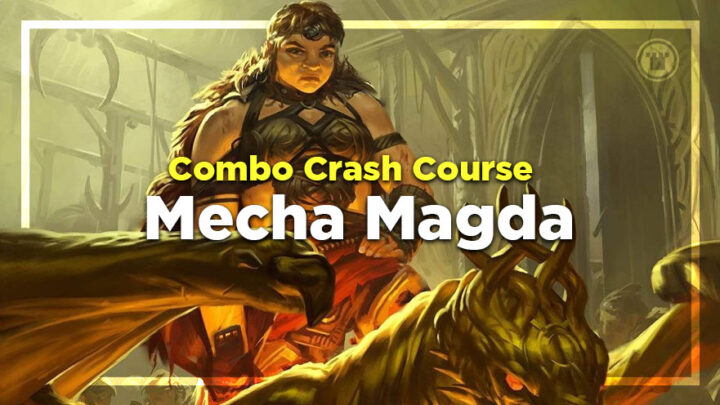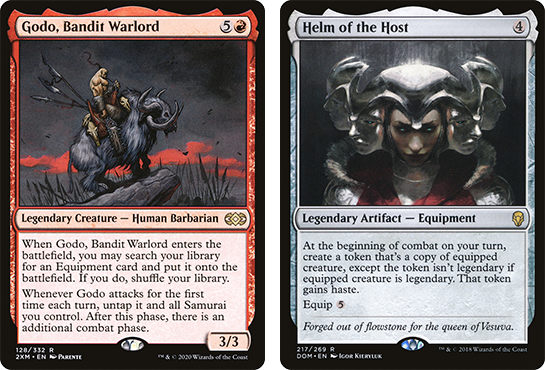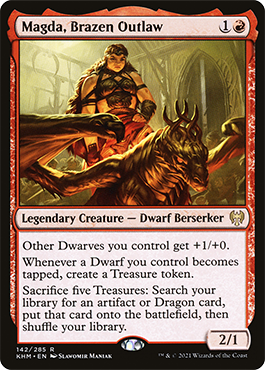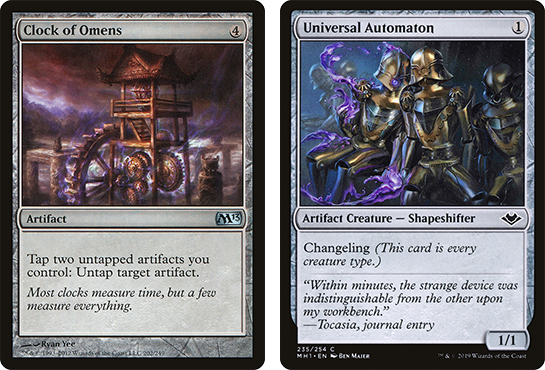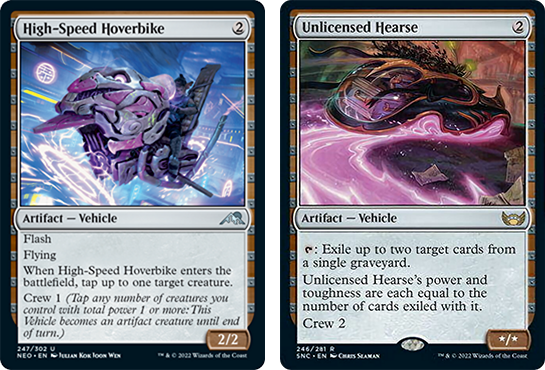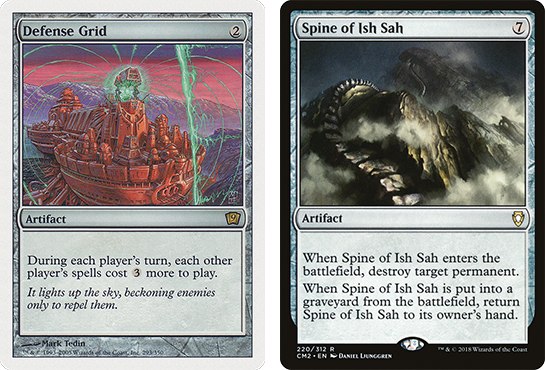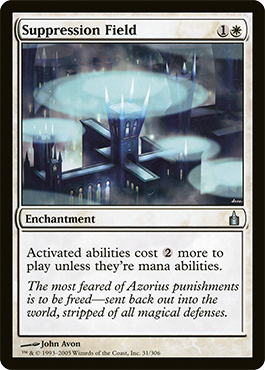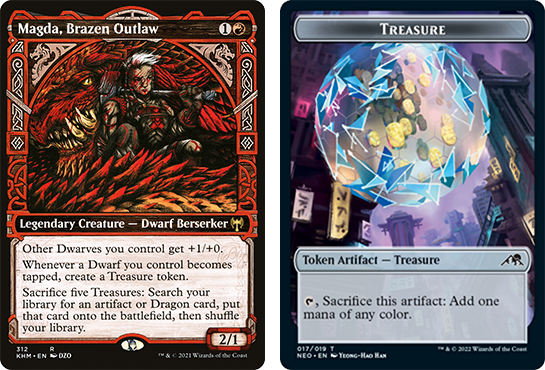Mecha Magda has taken the cEDH scene by storm, and Tom thinks it has potential to show up elsewhere – so here’s how it works!
No format in Magic loves a good combo quite like Commander. The Eternal card pool and a relaxed banlist allow players to pull together mind-blowing synergies from across time and space. Furthermore, the basic mechanics of 40-life cutthroat multiplayer inherently favor combo win conditions, which can explosively kill multiple opponents without much forewarning. It’s much easier to assemble Kiki-Jiki + Splinter Twin than it is to attack for 120 life or do 63 commander damage – especially when the A card in that A+B combo is guaranteed to be available from the command zone!
Commander-centric combos of this kind have become more and more popular over the years, especially in more competitive games. They’re a great tonic to the inherent inconsistency of Commander, while retaining the kind of strong deck identity which draws many players to the format.
Oftentimes these Commander combo decks are adapted from past Constructed archetypes like Splinter Twin or Flash Hulk. This one, however, was built specifically for the multiplayer metagame, achieving tournament success in the hands of Koibito. With great mana efficiency and an endgame to dwarf all others, could this be the Commander combo to make that cross-format leap the other way?
What is Mecha-Magda?
Koibito’s cEDH (competitive Commander) deck is built to harness the massive potential of its namesake commander choice: Magda, Brazen Outlaw. Her ability to explosively create mana makes her akin to a mono-red Devoted Druid lurking in the command zone. And just like Devoted Druid, it only takes one or two easily-tutored cards to “close the circuit” and achieve infinite Magda mana: in this case, Clock of Omens and any dwarf artifact creature.
Any untap effect pays dividends with Magda, but Clock of Omens is so good it’s like Koibito personally sent the card back in time to the Fifth Dawn design team. If you make one of your dwarves an artifact (or vice versa), you can tap it and Clock to activate the Clock’s ability – which can immediately untap that same mecha-dwarf on resolution! In the meantime, Magda’s trigger will have created an untapped treasure token from you tapping a dwarf. That treasure and the mecha-dwarf can tap to activate Clock again, of course targeting the dwarf, and just like that you’ve demonstrated a loop which creates infinite tapped treasure tokens (at a minimum).
Normally infinite tapped treasures would not be a threat to your opponent until your next turn, but this is where Madga enables god mode. You can now sacrifice the tapped treasure to her second ability to more or less put your whole library onto the battlefield (especially if you lead with Maskwood Nexus), which with proper deck building should kill your opponent on the spot!
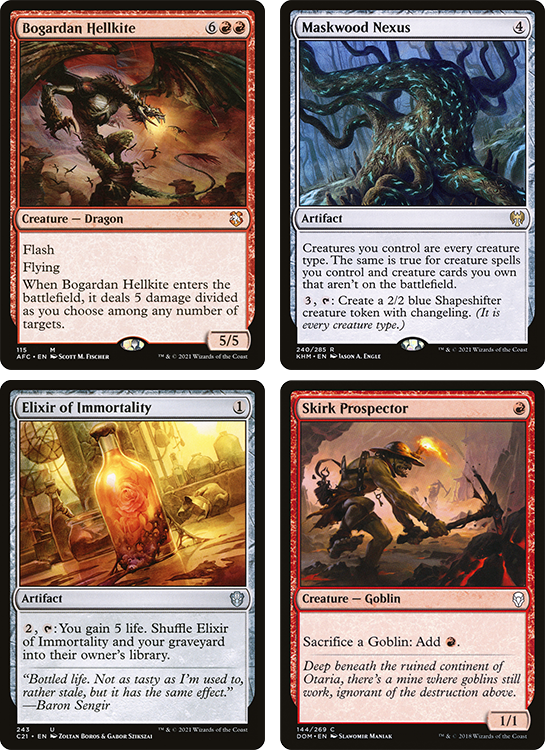
(Bogardan Hellkite; Maskwood Nexus; Elixir of Immortality; Skirk Prospector)
A Very Useful Engine
Even in a format where combo game plans are omnipresent, this one stands out in a variety of ways. The first is mana efficiency. Magda costs a mere 1R. The most expensive spell you actually pay for is Clock itself at four mana – comparable to Splinter Twin as a game-ending piece! The cards which help achieve your final combo requirement – an untapped dwarf artifact – cost between one and three mana.
That list of mecha-dwarf enablers is longer than you probably expect, which brings up another real strength of the deck: resilience and redundancy. While Clock is hard to replace in the final combo, you can make a ton happen through the midgame with a mix of cheap dwarf creatures, disruptive artifacts, and secondary value generators.
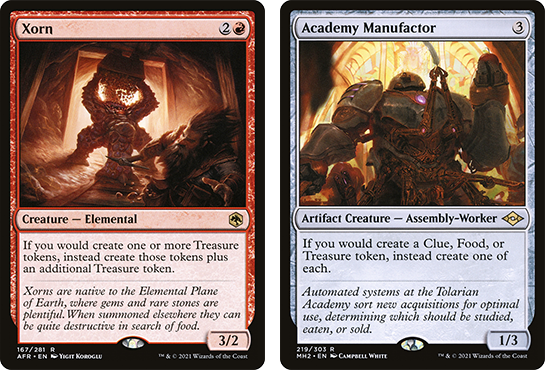
(Xorn; Academy Manufactor)
Even when your Clock of Omens is exiled, Magda and a couple of dwarves will still threaten to create a game-ending pile of treasure over just three or four turns. This threat becomes even more significant thanks to explosive treasure generators like Dockside Extortionist.
Of course, with treasure being one of the most obvious tempo mechanics in Magic, Mecha Magda naturally applies tremendous pressure even to opponents who can theoretically interact well.
Being able to stockpile mana like this breaks the foundational symmetry of the untap step – for each turn where you’re able to make treasure without meaningful action from either side, you pull further and further ahead. Just a couple of one-mana dwarfs can force control decks to start proactively spending resources, which in turn gives you more opportunity to land the real danger spells like Clock – or blow them out with some treasure-fuelled instants of your own!
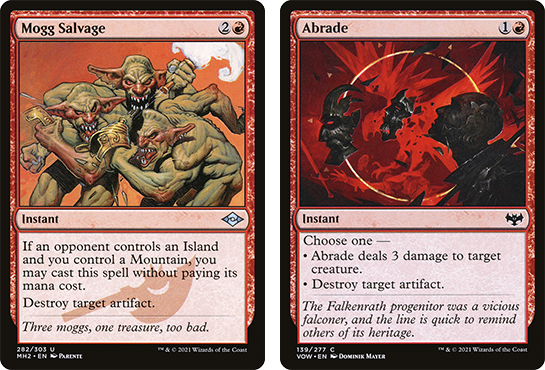
(Mogg Salvage; Abrade)
Combining the tempo advantage from treasure with the disruptive creatures and artifacts commonly played by mono-red and mono-white decks is what makes Mecha Magda strong enough to take on the various 4c blue piles in competitive Commander and beat them at their own game!
How to Beat It?
As we just went over, it can be hard to know when to try and interact with this deck, especially in Commander where copious treasure mana makes it impossible to keep Magda off the board.
While combined attention from multiple opponents likely makes assembling Magda + Clock impossible, the Mecha Magda player can simply slow the game down and build a resource advantage by attacking with random dwarves. Make sure you have blockers ready to shut down this easy treasure generation, but be warned it’s only a momentary setback; a single vehicle in play lets you tap all your dwarfs at will! Killing these vehicles – a bit easier once they’re inevitably crewed – should be a higher priority, along with any other permanents which allow for cheap Magda treasures up to Clock of Omens itself.
Exiling Clock of Omens (or Magda if she’s not the commander) is the single biggest blow you can deal to this archetype, but a range of effects will allow a prepared Magda player to shuffle the card between the library, graveyard and battlefield to try and fizzle this play. Disrupting the actual combo turn is an even taller task. There’s just not much that beats a combo which is essentially manaless, tutors for protection and answers mid-combo with no loss of momentum, and which can start or restart itself at instant speed in response to anything scary, knowing that it can comfortably win before the rest of the stack ever resolves!
No, the only real point to attack against Mecha Magda is the treasures themselves. Kill dwarves wherever practical to limit Magda’s casual treasure generation, and try to force her to spend what is created to defend or rebuild the board. This is why it’s rarely bad to remove Magda even if she’ll almost always be right back from the command zone; any treasure spent there is less Magda activations which can be cashed in for interaction or comboing off.
While trying to proactively kill treasure tokens might sound odd, it is reasonable in this matchup given how Magda likes to hoard them. But even a sweeper like Meltdown or Culling Ritual still leaves a window to tutor in response. In the face of such powerful freedom to act, the best defense is to have already played out the kind of static abilities which stop Magda and her treasures working in the first place.
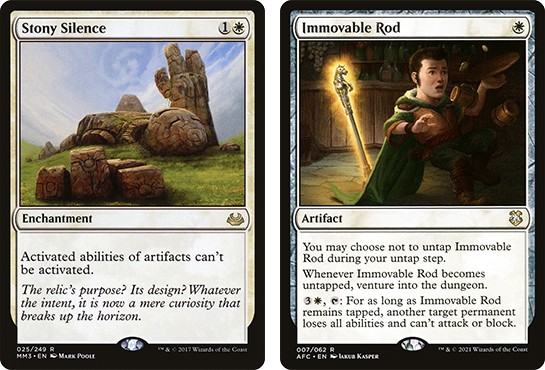
(Stony Silence; Immovable Rod)
Stony Silence won’t stop Magda making or sacrificing treasures, but it will prevent them being used for mana – and more importantly, it shuts down the big threat in Clock of Omens.
Blanking the text of Magda herself can be equally effective, although stopping both the triggered and activated abilities with a Humility effect is the key; something like Phyrexian Revoker is much less convincing if she’s still able to make and spend treasures.
This makes Suppression Field the single best bullet you can have against the deck, heavily taxing Magda’s tutoring and Clock of Omens shenanigans. While there are ways for Magda to boost the resource gain of the combo with additional permanents and eventually battle through Suppression Field, it’s still more or less a death sentence unless removed – so watch out for a desperation Spine of Ish Sah tutor!
Other classic anti-artifact and anti-treasure cards like Disciple of the Vault, Magnetic Mine, Yasharn, Implacable Earth and Kataki, War’s Wage are quite good, particularly if you can get them down early and let the effects accumulate. Sadly, Rule of Law – otherwise one of the better combo-beaters in Commander – does very little to stop Mecha Magda. Not only can she choose to slow down and comply with Rule without much struggle, but her tutoring ability neatly avoids having to cast a pile of spells on her combo turn in order to win. On the other hand, playing something like Grafdigger’s Cage or Weathered Runestone will at least stop the worst results of the combo until she can draw into removal – and with a notable lack of true card draw in the deck, that could buy you a lot of time!
Command and Conquer
Mecha Magda is such a refreshing and unique combo, and its emergence in the Commander metagame has led to a renewed enthusiasm for mono-color decks at all power levels. It plays a ton of untouched older cards (dwarves!) and some recent gems too. I’m astonished and delighted at how fully-fledged the game plan is already, and how well it looks to be able to evolve with new printings. With so much going in its favor, I really do wonder how long we have until the deck has another breakout win – this time in Modern or Legacy.
Yet even in such an event, Mecha Magda will remain a quintessential Commander combo. It makes great use of the format’s unique rules, abides by its flavor, and cleverly overcomes its deckbuilding constraints. Its mastery of tempo and ability to dominate the stack when it counts are the signs of a deck perfectly adapted to the multiplayer environment. Congratulations to Koibito on pioneering such a deck – and good luck to the many new Magda fans now preparing to follow in their footsteps.

Tom’s fate was sealed in 7th grade when his friend lent him a pile of commons to play Magic. He quickly picked up Boros and Orzhov decks in Ravnica block and has remained a staunch white magician ever since. A fan of all Constructed formats, he enjoys studying the history of the tournament meta. He specializes in midrange decks, especially Death & Taxes and Martyr Proc. One day, he swears he will win an MCQ with Evershrike. Ask him how at @AWanderingBard, or watch him stream Magic at twitch.tv/TheWanderingBard.

